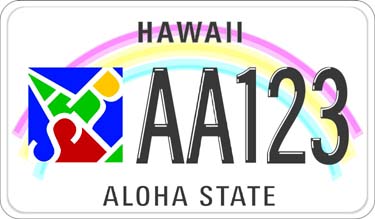

|
Kokua Line June Watanabe |
Not all nonprofits profit
from special license platesQuestion: Who can I call for more information on the City & County of Honolulu's "organization license plate" program for nonprofit organizations?
Answer: The contact agency is the City & County of Honolulu's Division of Motor Vehicle, Licensing and Permits.
You should send a letter requesting information to Dennis Kamimura, Licensing Administrator, Division of Motor Vehicle, Licensing and Permits, P.O. Box 30300, Honolulu 96820-0300; or send a fax to 532-7722.
Kamimura said his office will then mail you the information, as well as provide a contact number if you have additional questions.
He cautioned organizations to think twice about looking to these license plates as a means of raising funds, because it's turned out not to be the money maker many had hoped it would be.
COURTESY IMAGE
Nonprofit organizations can have special license plate decals, like this one for the Hawaii Alliance for ARTS Education.
The organization plates have the familiar rainbow design with two letters and three numbers aligned on the right, leaving room for a 3-inch-by-3-inch organization decal to be placed on the left side of the plate.
Ordered decals are sent to Kamimura's office, then distributed statewide to all county motor vehicle registration offices. Thus, all available organization decals can be purchased in all counties.
The organization license plate program is aimed mainly at organizations registered with the Internal Revenue Service as nonprofits, and that can certify a minimum 150 applications for the special plates.
But what's happened is that although 24 organizations (not counting the City & County of Honolulu's offering) have obtained special plates since the city began issuing them in 2000, 19 have not had at least 150 people actually buy their plates.
The law only requires that an organization certify that it has a minimum of 150 people who will apply for the plates, Kamimura said.
"Many of the organizations poll their members and they are told that when the decals become available, they will purchase the plates," he said.
Many normally order above the minimum number because of the promises.
But what happens is that many of the people who said they would purchase the plates never do and the organizations are left holding the overflow, Kamimura said.
The only organizations that have sold more than 150 plates each are the Bishop Museum, the Hawaii Alliance for ARTS Education, the Hawaiian Humane Society, the Honolulu Fire Department Firemen's Fund and the Honolulu Police Relief Association, plus the city, which issues the commemorative America United plates.
"I always caution new organizations that the chances of success in this program are not in their favor, based upon the experiences of other organizations. Rather than making money for the organization, they may lose money," Kamimura said.
He explained that the organizations must pay the city's designated decal manufacturer directly to manufacture their special decals.
"The 19 organizations that have not met the 150 applicants (requirement) have probably not recouped the amount they had expended to purchase the decals," he said.
Those who choose to go forward must have their organization decals approved first by Kamimura's office and by the police chiefs in each county.
Except for the America United plate, an organization plate costs $25, plus the usual $5.50 plate and emblem replacement fee charged by the counties.
Of the $25 fee, the organization gets $20, while $5 goes to the counties to cover administrative costs. The $25 fee would have to be paid every year the organization plate is renewed.
The America United license plate, which is issued by the city to recognize victims of the Sept. 11, 2001, terrorist attacks, is not assessed the $25 fee.
Not surprisingly, because of increased feelings of patriotism and no additional charge, the number of America United decals issued is almost as many as the number issued for all other organizations offering special plates combined.
About 26,000 pairs of America United decals (for the front and back plates) have been issued, compared to the approximately 28,000 pairs of decals issued for the 24 other organizations, Kamimura said.
If an organization does not meet the 150-applicant requirement "in a reasonable amount of time, the organization will be removed from the program," he said.
Organization license plates are different from specialized plates issued for various military-related activities: veterans plate; combat veteran; Pearl Harbor survivor; World War II, Korean War or Vietnam War veteran; Purple Heart recipient; and POW.
These specialized plates have no decals and are issued for an extra $5.50 each. Applicants must have some document to prove the appropriate military service.
Mahalo
To the good Samaritan who turned in my credit card holder with all my credit cards inside to Home Depot on Dec. 28, 2003. I was in a panic when I realized I didn't have it in my purse. Mahalo also to Home Depot for contacting me to pick up my wallet immediately after. May the new year hold only good blessings for all the honest people out there. -- C. Mishina
|
See the Columnists section for some past articles.
Got a question or complaint?
Call 529-4773, fax 529-4750, or write to Kokua Line,
Honolulu Star-Bulletin, 500 Ala Moana Blvd., No. 7-210,
Honolulu 96813. As many as possible will be answered.
E-mail to kokualine@starbulletin.com
